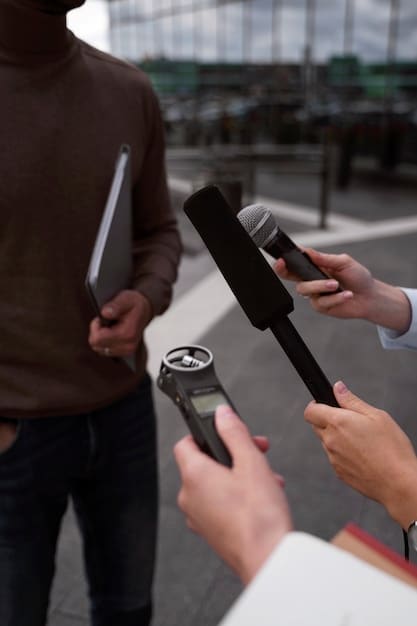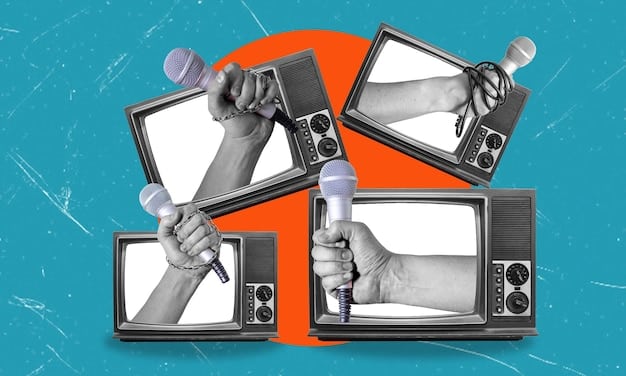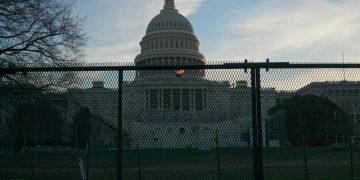Unveiling Truth: The Media’s Role in Political Scandals

The role of the media in uncovering political scandals involves investigative reporting, courageous journalists, and a commitment to transparency, holding power accountable and informing the public about corruption and abuses within political systems.
The role of the media in uncovering political scandals is vital for a healthy democracy. This article explores how journalists act as watchdogs, investigating and reporting on corruption and abuse of power, thereby holding politicians accountable and informing the public.
The Critical Function of Investigative Journalism
Investigative journalism plays a central role in unveiling political wrongdoings. It requires extensive research, meticulous fact-checking, and a tenacious pursuit of the truth.
Deep Dive into Investigative Techniques
Investigative journalists often use a variety of techniques, including analyzing public records, conducting interviews with whistleblowers, and employing undercover operations to gather evidence of corruption.
Landmark Cases of Media Exposure
History is replete with examples of media outlets uncovering significant political scandals. From Watergate to the Panama Papers, investigative journalism has exposed corruption at the highest levels of power.
- Watergate exposed abuse of power by President Nixon.
- The Pentagon Papers revealed the truth about the Vietnam War.
- The Panama Papers uncovered offshore tax havens used by politicians and celebrities.

Ultimately, the ability of investigative journalism to act as a check on political power depends on the independence and resources of the media. A free and well-funded press is essential for holding politicians accountable and informing the public about corruption.
Ensuring Transparency and Accountability
The media’s role extends to ensuring that political processes are transparent and that individuals in power are held accountable for their actions. This is a cornerstone of a healthy democratic society.
The Impact of Media Scrutiny on Political Behavior
The constant scrutiny of the media can influence political behavior, encouraging leaders to act more ethically and transparently. Fear of exposure can be a powerful deterrent against corruption.
Legal and Ethical Frameworks Supporting Media Freedom
Legal protections for journalists, such as shield laws, are essential for ensuring that they can report on sensitive topics without fear of reprisal.
Transparency initiatives, such as open government laws, also play a crucial role in providing the media with access to information needed to hold politicians accountable.
- Shield laws protect journalists from being forced to reveal their sources.
- Open government laws ensure public access to government records and meetings.
- Whistleblower protection laws encourage individuals to report wrongdoing.
In conclusion, a commitment to ensuring transparency and accountability is vital for maintaining public trust in political institutions. The media plays a critical role in this process by shining a light on potential abuses of power.
Challenges Faced by the Media in Scandal Coverage
Despite its crucial role, the media faces numerous challenges when covering political scandals. These include legal threats, smear campaigns, and declining resources.
Navigating Legal and Political Obstacles
Journalists often face legal challenges, such as defamation lawsuits and gag orders, designed to silence their reporting. They also have to navigate a complex political landscape, where powerful individuals and institutions may try to suppress unfavorable stories.
Combating Misinformation and Disinformation
The rise of social media has made it easier for misinformation and disinformation to spread, undermining the credibility of legitimate news sources. Journalists must actively combat these falsehoods by providing accurate and reliable information.
The spread of false narratives can sometimes be intentional, created to discredit the media or distract from the real issues at hand.
- Defamation lawsuits can silence critical reporting.
- Gag orders restrict the media’s ability to report on certain cases.
- Misinformation campaigns undermine the credibility of legitimate news sources.

In short, the media must overcome significant hurdles to effectively cover political scandals. Maintaining independence, accuracy, and resilience is essential for fulfilling its watchdog role.
Ethical Considerations in Reporting Scandals
Ethical considerations are paramount in reporting on political scandals. Journalists must balance the public’s right to know with the need to protect individual privacy and avoid sensationalism.
Balancing Public Interest and Individual Privacy
Reporting on scandals often involves sensitive information that could damage reputations or careers. Journalists must carefully weigh the public interest against the potential harm to individuals.
Avoiding Sensationalism and Bias
Sensationalizing a story can attract more readers or viewers, but it can also undermine the credibility of the media. Journalists must strive to present the facts in a fair and unbiased manner.
Objectivity is not always possible, but journalists should aim to minimize personal biases and present multiple perspectives on an issue.
- Accuracy is paramount for maintaining credibility.
- Fairness ensures that all sides of a story are presented.
- Transparency builds trust with the audience.
Ultimately, ethical reporting is essential for maintaining public trust in the media and ensuring that scandals are covered responsibly.
The Evolution of Media’s Role in the Digital Age
The digital age has transformed the media landscape, creating new opportunities and challenges for reporting on political scandals. Social media, citizen journalism, and online platforms have all reshaped the way news is disseminated and consumed.
Social Media and Citizen Journalism
Social media has empowered citizens to report on events and share information directly with the public, bypassing traditional media outlets. This can lead to more diverse perspectives and faster dissemination of news, but it also raises concerns about accuracy and verification.
The Impact of Online Platforms on News Consumption
Online platforms have become dominant sources of news for many people, but they also create echo chambers and filter bubbles, where individuals are only exposed to information that confirms their existing beliefs.
The speed and reach of online communication have made it easier for scandals to spread quickly, but also harder to control the narrative.
- Social media enables rapid dissemination of information.
- Citizen journalism provides diverse perspectives.
- Online platforms create echo chambers and filter bubbles.
In summary, the digital age has profoundly impacted the media’s role in uncovering political scandals. Navigating these new technologies and challenges requires adaptability, critical thinking, and a commitment to journalistic integrity.
Case Studies: Notable Examples of Media Impact
Examining specific cases where the media played a crucial role in uncovering political scandals can illustrate the importance of their function and the impact it has on society.
Watergate Scandal
The Watergate scandal, uncovered by *The Washington Post*, led to President Nixon’s resignation and highlighted the importance of investigative reporting in holding political figures accountable.
The Pentagon Papers
*The New York Times*’ publication of the Pentagon Papers exposed the truth about the Vietnam War, revealing government deception and sparking widespread public debate about US involvement in the conflict.
Other Significant Cases
Many other cases illustrate the power of the media to uncover wrongdoing, from local corruption scandals to international human rights abuses.
- The Watergate scandal led to President Nixon’s resignation.
- The Pentagon Papers revealed government deception about the Vietnam War.
- Numerous local and international cases underscore the media’s watchdog role.
These case studies demonstrate the critical role that a free and independent press plays in a democratic society.
| Key Point | Brief Description |
|---|---|
| 🔍 Investigative Journalism | Uncovers political wrongdoings through deep research and fact-checking. |
| 🏛️ Transparency and Accountability | Ensures political processes are open and leaders are held responsible. |
| 🛡️ Challenges Faced by Media | Legal threats and misinformation campaigns. |
| 🌐 Digital Age Impacts | Social media and online platforms reshape news consumption. |
Frequently Asked Questions
▼
The media acts as a watchdog, ensuring transparency and accountability in politics. It investigates and publishes information that holds leaders responsible, and informs the public so they can decide.
▼
Challenges include legal threats, political pressure, misinformation, and declining resources. These obstacles can impede the media’s ability to report accurately and can put journalists at risk.
▼
The digital age has amplified the media’s reach through social media and online platforms. It has also created challenges with misinformation spreading, and the need for accuracy over speed of dissemination.
▼
Ethical considerations include balancing public interest with individual privacy, avoiding sensationalism, and ensuring fairness and accuracy in reporting. Maintaining trust is paramount in the face of political scandal.
▼
Watergate, uncovered by *The Washington Post*, is a notable case. Also, the Pentagon Papers by *The New York Times* are other significant cases that underscore the media’s critical investigative role.
Conclusion
In conclusion, the role of the media in uncovering political scandals is essential for ensuring a healthy democracy. By acting as watchdogs, providing accurate information, and holding those in power accountable, the media helps to maintain public trust and promote ethical governance.





